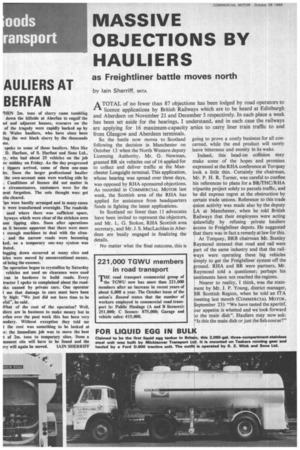MASSIVE OBJECTIONS BY HAULIERS
Page 20

If you've noticed an error in this article please click here to report it so we can fix it.
as Freightliner battle moves north
by lain Sherriff, MITA A TOTAL of no fewer than 87 objections has been lodged by road operators to licence applications by British Railways which are to be heard at Edinburgh and Aberdeen on November 21 and December 5 respectively. In each place a week has been set aside for the hearings, I understand, and in each case the railways are applying for 16 maximum-capacity artics to carry liner train traffic to and from Glasgow and Aberdeen terminals.
So the battle now moves to Scotland following the decision in Manchester on October 13 when the North Western deputy Licensing Authority, Mr. G. Newman, granted BR six vehicles out of 16 applied for to collect and deliver traffic at the Manchester Longsight terminal. This application, whose hearing was spread over three days, was opposed by RHA-sponsored objections. As recorded in COMMERCIAL MOTOR last week, the Scottish area of the RHA has applied for assistance from headquarters funds in fighting the latest applications.
In Scotland no fewer than 11 advocates have been invited to represent the objectors, and Mr. L. G. Stokoe, RHA Scottish area secretary, and Mr. J. S. MacLachian in Aberdeen are busily engaged in finalizing the details.
No matter what the final outcome, this is going to prove a costly business for all concerned, while the end product will surely leave bitterness and enmity in its wake.
Indeed, this head-on collision may make some of the hopes and promises expressed at the RHA conference at Torquay look a little thin. Certainly the chairman, Mr. P. H. R. Turner, was careful to confine his references to plans for a BR/THC/RHA tripartite project solely to parcels traffic, and he did express regret at the obstruction by certain trade unions. Reference to this trade Union activity was made also by the deputy LA at Manchester, when he told British Railways that their employees were acting anlawfully by refusing private hauliers access to Freightliner depots. He suggested that there was in fact a remedy at law for this.
At Torquay, BRB chairman Mr. Stanley Raymond stressed that road and rail were part of the same industry and that the rail were operating these big vehicles v imply to get the Freightliner system off the *round. RHA and BR were partners, Mr. Raymond told a questioner; perhaps his
ieentiments have not reached the regions. Nearer to reality, I think, was the stateent by Mr. J. P. Young, district manager, R Scottish Region, when he told an 'TA eeting last month (COMMERCIAL MOTOR, ptember 23): "We have tasted the aperitif, ur appetite is whetted and we look forward o the main dish". Hauliers may now ask: 'Is this the main dish or just the fish course?"
























































































































